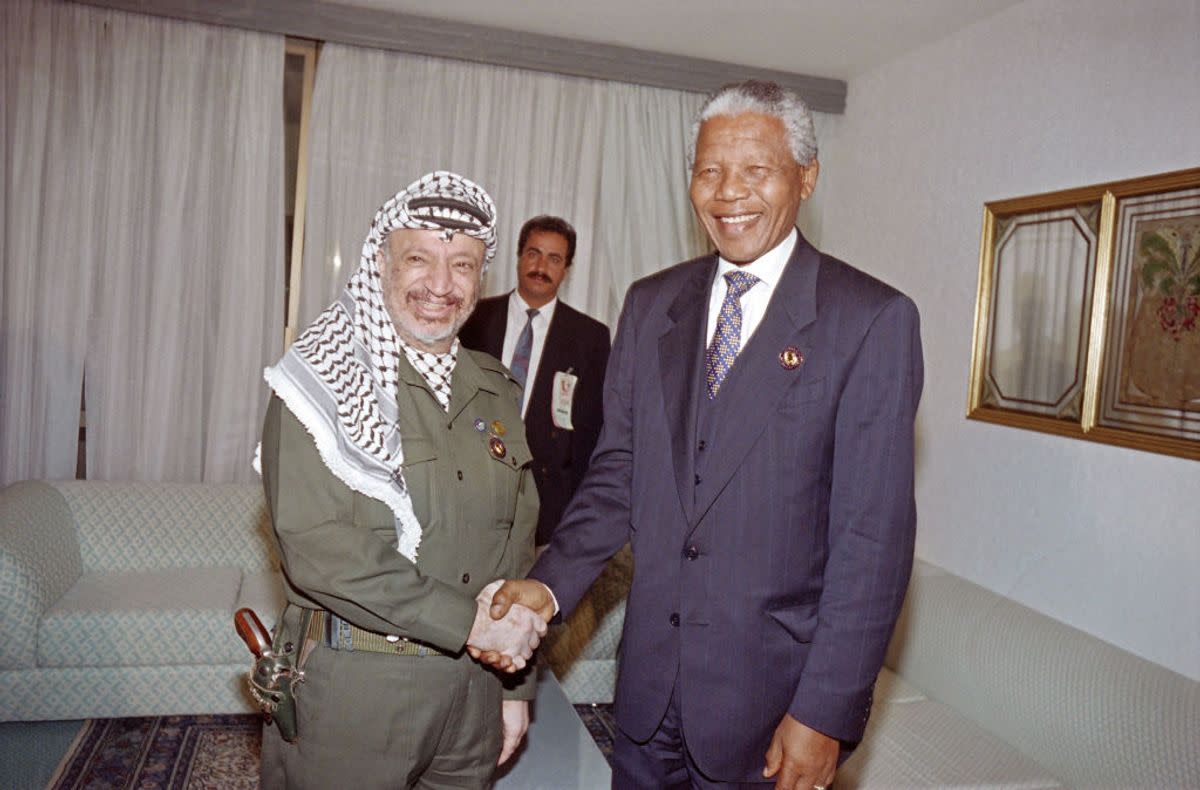Fact Check: Nelson Mandela Said 'Our Freedom Is Incomplete Without the Freedom of the Palestinians'

Claim:
Nelson Mandela said, “[...] we know too well that our freedom is incomplete without the freedom of the Palestinians.”
Rating:
The protracted, often bloody Israeli-Palestinian conflict exploded into a hot war on Oct. 7, 2023, when the militant Palestinian group Hamas launched a deadly attack on Israel and Israel retaliated by bombarding the Gaza Strip. More than 20,000 people, the vast majority of them Palestinians, were reportedly killed during the first two months of the war alone. The violence is driven by mutual hostilities and territorial ambitions dating back more than a century. The internet has become an unofficial front in that war and is rife with misinformation, which Snopes is dedicated to countering with facts and context. You can help. Read the latest fact checks. Submit questionable claims. Become a Snopes Member to support our work. We welcome your participation and feedback.
In late 2023 and early 2024, as the Israel-Hamas conflict continued and Israel bombarded Gaza, many online began to share a quote allegedly by South African anti-apartheid activist Nelson Mandela in which he spoke in solidarity with the Palestinian people.
According to numerous posts, Mandela said, “We know too well that our freedom is incomplete without the freedom of the Palestinians.”
Nelson Mandela said it Best 👏 pic.twitter.com/fsOKaXGl4l
— Khalissee (@Kahlissee) January 15, 2024
Mandela did indeed say the above words in 1997, during a speech he made at the International Day of Solidarity with Palestinian People in Pretoria, South Africa, according to his official speech transcripts and verified social media accounts. We thus rate this a Correct Attribution.
The transcript of the speech is available on Mandela’s official website. In full, he expressed solidarity with Palestinians and others in conflict zones like Sudan and East Timor. The quote (emphasis, ours) can be found in bold below:
When in 1977, the United Nations passed the resolution inaugurating the International Day of Solidarity with the Palestinian people, it was asserting the recognition that injustice and gross human rights violations were being perpetrated in Palestine. In the same period, the UN took a strong stand against apartheid; and over the years, an international consensus was built, which helped to bring an end to this iniquitous system.
But we know too well that our freedom is incomplete without the freedom of the Palestinians; without the resolution of conflicts in East Timor, the Sudan and other parts of the world.
We are proud as a government, and as the overwhelming majority of South Africans to be part of an international consensus taking root that the time has come to resolve the problems of Palestine.
The same quote was shared on the verified Facebook page for the Nelson Mandela Foundation back in 2020.
This was not the first or last time Mandela supported Palestinians. In a 1998 speech in which he honored the Palestine Liberation Organization (PLO) leader Yasser Arafat, he said:
South Africa is proud to be part of the international consensus affirming the right of Palestine to self-determination and statehood. We are committed to playing our humble part, within the limits of our resources, to help ensure that Palestine assumes its rightful position in the global arena.
In 1990, he called Arafat his "comrade in arm" and said South Africans identified with the PLO. He also said he never doubted Israel's right to exist "within secure borders." though he simultaneously called on Israel to return "the territories they conquered from the Arab world."
According to South African journalist Nick Dall, while Mandela's party, the African National Congress (ANC) was formed under the principles of non-violent resistance against apartheid rule, he eventually pushed them to abandon this principle after a massacre of around 69 innocent Black South Africans by police. The ANC then formed a paramilitary wing to resist apartheid rule. During a state visit to the Palestinian Territories in 1999, Mandela said: “Choose peace rather than confrontation. Except in cases where we cannot get, where we cannot proceed, or we cannot move forward. Then if the only alternative is violence, we will use violence.”
In January 2024, South Africa continued its history of solidarity with the Palestinian people by launching a case against Israel at the International Court of Justice (ICJ) accusing Israel of committing genocide against Palestinians in Gaza.
Three years after Mandela’s death in 2013, the people of the occupied West Bank city of Ramallah commemorated Mandela by unveiling a giant statue of the South African leader.
Sources:
Dall, Nick. “Unpack the Past: When Nelson Mandela Wore the Palestinian Keffiyeh.” Al Jazeera, https://www.aljazeera.com/features/2023/12/5/unpack-the-past-mandela-the-keffiyeh-and-south-africas-palestine-embrace. Accessed 15 Jan. 2024.
“Day One of the ICJ Genocide Hearing against Israel: Key Takeaways.” Al Jazeera, https://www.aljazeera.com/news/2024/1/11/day-one-of-the-icj-genocide-hearing-against-israel-key-takeaways. Accessed 15 Jan. 2024.
Kurtz, Howard. “MANDELA REITERATES SUPPORT FOR ARAFAT, GADHAFI, CASTRO.” Washington Post, 22 June 1990. www.washingtonpost.com, https://www.washingtonpost.com/archive/politics/1990/06/22/mandela-reiterates-support-for-arafat-gadhafi-castro/072b9d2a-ec38-4d6e-b680-b6afeebe5013/. Accessed 15 Jan. 2024.
"Nelson Mandela - Speeches - Address by President Nelson Mandela at International Day of Solidarity with Palestinian People, Pretoria." Mandela.gov.za, 1997, http://www.mandela.gov.za/mandela_speeches/1997/971204_palestinian.htm. Accessed 15 Jan. 2024.
"Nelson Mandela: What the South African Icon Said about Palestine." Middle East Eye, www.youtube.com, https://www.youtube.com/watch?v=6fJ0AiO9lvo. Accessed 15 Jan. 2024.
"Speech by President Nelson Mandela at the Banquet in Honour of President Yasser Arafat of Palestine." NMF Archive. https://atom.nelsonmandela.org/index.php/za-com-mr-s-613. Accessed 15 Jan. 2024.

 Yahoo News
Yahoo News 

